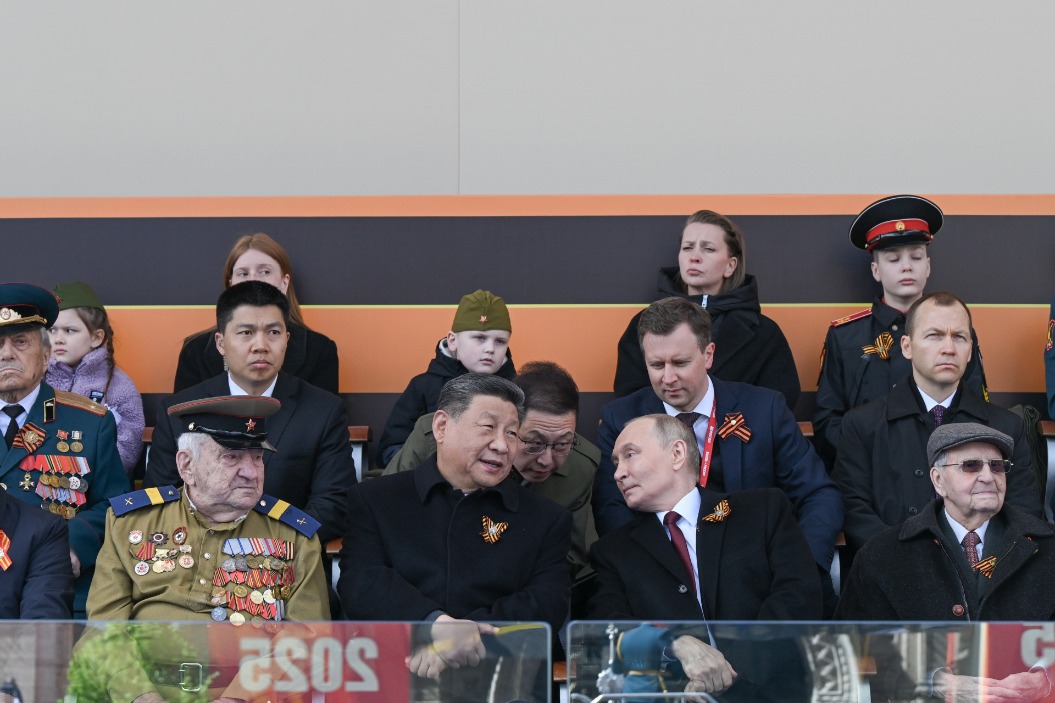Making global institutions multilateral


China should do more to increase participation of developing countries in global governance
The rise of strategic rivalry between the United States and China has intensified and this has become especially acute in the global governance system. The Joe Biden administration has made it clear in its National Security Strategy that the aim is to "outcompete" China in the global governance domain. In the US' script for strategic competition with China, global institutions such as the United Nations play key roles and are becoming one of the main battlegrounds for the US against China.
The influence of a sovereign nation in a multilateral institution can be measured from six dimensions, including the formulation of the institution's charter and location of its headquarters, capital contributions and subscriptions, voting power, the personnel, the coalition of allies, and the domestic supporting system.
If the influences of China and the US in the five key institutions governing global politics, trade, health, finance and development — namely the UN Secretariat, the World Trade Organization, the World Health Organization, the International Monetary Fund and the World Bank Group — are compared, it can be seen that China's influence has made some headway but still lags far behind that of the US.
The US played a dominant role in the formulation of the charters for the five institutions. The headquarters of these institutions resides either in the US or in an ally's territory.
For the funding of the five institutions, the US and China are the top two contributors for the UN's regular budget, the budget of the WTO, and voluntary contributions of the WHO. Yet, the accumulated contributions of the US to the UN regular budget between 2000 and 2022 were four times larger than that of China. The accumulated voluntary contributions of the US to the WHO was 51 times larger than that of China between 2014 and 2019. After the outbreak of the COVID-19 pandemic, China increased its contribution to the WHO nearly five-fold, from $6.43 million in 2019 to $30.85 million in 2020. Yet the US contribution was far greater. The gap is even greater when the non-governmental US contributions are taken into account. For instance, the Gates Foundation alone contributed $376 million to the WHO in 2020, 3.5 times higher than the US government's voluntary contributions. When it comes to the funding of the IMF and the World Bank Group, the US remains the largest contributor while China is at best among the top 10. The US' position as the largest donor gives it the capability to wield dominant influence in these institutions.
While the UN agencies adopt a "one country one vote" mechanism, the voting power of a sovereign nation in the IMF and the World Bank Group is weighted according to its share of capital subscriptions, which is calculated based on a complex formula that considers the nation's GDP, openness, economic variability, and international reserves, among others. At the moment, the US takes up the largest voting power in the IMF and the World Bank Group, exceeding 15 percent of total voting power (except in the International Development Association), making it the sole member with veto power in these institutions.
Regarding the nationality of professional staff members in the five institutions, Chinese nationals are substantially outnumbered and outranked by US citizens. In 2021, among the nearly 120,000 people employed by the UN system worldwide, 5,567 were US citizens, ranking the highest, while 1,471 were Chinese, ranking 23rd. Similarly, by June 2021, the IMF employed 700 US citizens, accounting for 20 percent of the total staff, while only 224 Chinese worked in the institution, accounting for just 6 percent of the total.
US citizens also take four leadership seats at the UN Secretariat and regional commissions, compared to one Chinese. The situation is the same in the IMF and the World Bank Group. US influence is even greater if the educational background of the professionals is considered. In the leadership of all five institutions, those who have received higher education in the US accounted for 40 percent to 70 percent, while few have gained any educational experience in China.
In terms of coalition in the multilateral institutions, the US enjoys the support of its allies represented notably by the G7. In the IMF and the World Bank Group, the weighted voting power of the G7 combined is around 40 percent, which gives the group the decisive power on almost all decisions that require majority voting. In contrast, the total voting power of China and partners remains below 15 percent, deprived of any possible veto power in the two institutions.
For the domestic support system, it is illuminating to compare the think tanks working on global governance in the two countries. According to the 2020 Global Go To Think Tank Index Report of the University of Pennsylvania, among the top international development policy think tanks, 22 were from the US while four were from China; among the top international economics policy think tanks, 16 were from the US while four were from China; and among the top foreign policy and international affairs think tanks, 30 were from the US and six from China. In addition, the US think tanks took most of the top 10 seats. These reflect to some extent the unparalleled domestic strength of the US supporting its policies and actions in the global governance system.
As such, though China's participation in and support for global institutions has deepened, China still lags far behind the US in many ways. The US is doing great damage by turning the global institutions into a battlefield for great power competition. To uphold true multilateralism, and broaden and strengthen the voice and participation of developing countries in global governance in a changing world, China could make further efforts in the following aspects.
First, to work with partner countries to initiate the establishment of new global institutions in frontier areas, such as data, carbon emissions, and knowledge cooperation, where global rules and norms remain insufficient and obscure.
Second, to make more contributions to the key institutions within its capability, especially to those institutions facing financial constraints due to the US' failure in meeting its financial obligations.
Third, to cultivate more talent at both junior and senior levels to raise the representativeness of China in multilateral institutions to the level proportionate to its contributions and to its weight in the global economy.
Fourth, to work more closely with developing partners to voice the opinions of the developing world and steer global development agenda toward the priorities that developing countries value most.
Fifth, to invest and encourage more in the development of domestic think tanks working on global governance issues to provide evidence-based, long-term and forward-looking research support to policymakers.
Zhou Yu is an assistant researcher at the China Center for International Knowledge on Development. Zhou Taidong is the director of the division of general affairs at the China Center for International Knowledge on Development. The authors contributed this article to China Watch, a think tank powered by China Daily. The views do not necessarily reflect those of China Daily.
Contact the editor at editor@chinawatch.cn.
































